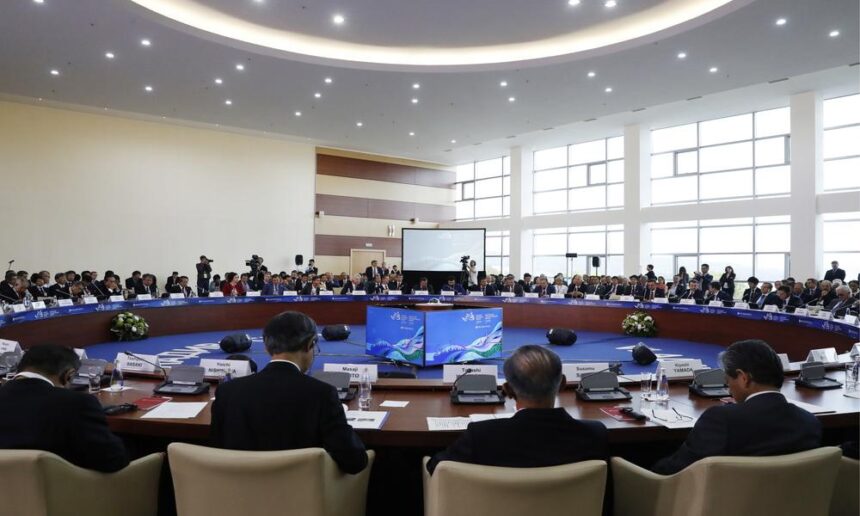Last week Vladivostok was host to the third Eastern Economic Forum, which saw attendance of political and business representatives, including Mongolian President Kh.Battulga. During the forum our president had meetings with Russian President Vladimir Putin, Japanese Prime Minister Shinzo Abe, and President of Korea Moon Jae-in.
Investopress reported that over 700 political and business professionals participated in the forum, representing 70 companies and 55 countries, including China, India, Japan, and South Korea. Yury Trutnev, Presidential Plenipotentiary Envoy to the Far Eastern Federal District, said that 217 agreements were signed during the forum and their total worth reached 2.5 trillion rubles (~ 44 billion USD), and a total of 38 billion USD was invested in the region in the last three years.
The intention of this column is to share my views on what conclusions can be drawn from the Eastern Economic Forum on conceptual, strategic, and operational levels.
Conceptual level
Mongolian can join any economic organizations founded by one of our neighboring countries, but still remain as an observer in the Shanghai Cooperation Organization (SCO) and freely work together with our ‘third neighbors’.
Russia, our neighbor in the north, is pursuing a policy to develop its Far East by focusing on a specific region and a city first (referred to as ‘advanced development territory’), and making them the centers of development for others to follow. The forum discussions involved increasing the benefits of advanced development territories, the progress of Vladivostok infrastructure and free port development, the program that allows people to receive a hectare of land for free, key issues facing the transport, fishery, lumber, gold and diamond mining industries, and attracting foreign investment.
At the forum President Putin encouraged the countries in the Pacific region to work together in the Russian Far East. Against the backdrop of economic sanctions from the West, Russians are ramping up their Eurasian economic integration initiative on all fronts.
The Eurasian Economic Union, which traces back to the Customs Union founded by Russia, Belarus, and Kazakhstan, now has Armenia and Kyrgyzstan as members. The member countries of this union are to conduct integrated economic policies that allow free flow of goods, services, finance, and workforce between them. Sergey Donskoy, Minister of Natural Resources and Environment of Russia, mentioned at the Russia-Mongolia business forum that Mongolians are working with the Eurasian Economic Commission, which is a regulatory body for the Eurasian Economic Forum, to establish an agreement.
It looks like the implementation of the China-Russia-Mongolia economic corridor agreement established last year in Tashkent, as well as the agreement on freight transport through Russia will depend on whether Mongolia joins the Eurasian Economic Forum.
China’s Belt and Road initiative is a multi-trillion dollar project that spreads across 65 countries over two continents. We still have not seen the commencement of projects to build large rail and road corridors in Mongolia.
The Nikkei Asia Review said that the two large projects initiatied by Russia and China are different in terms of their meaning, purpose, investment, direction and capability. If they end up overlapping with each other, this would happen in a free economic zone under the Shanghai Cooperation Organization. However, the recent membership of India and Pakistan, who share a conflict and high cross-border trade tariffs, would postpone the free economic zone.
Strategic level
Mongolia should continue its strategy to have balanced, equal relationships with Russia and China, and develop economic cooperation. The second state visit of our President should be to China, our biggest trade and investment partner.
President Battulga proposed to make our economic cooperation with Russia more advanced, receive a ruble loan from Russia and reform the Ulaanbaatar Railway joint stock company, and ratify the dialogue on freight transit through Russia. He also expressed his willingness to expand collaboration on culture and education, increase Russian language training, and strengthen cooperation in the humanitarian field.
Russian President Putin promised to turn his attention to cooperation in agriculture with special focus on livestock health in Mongolia, reduced tariffs for transit freight, and the reform of Ulaanbaatar Railway.
If Russia’s promise remains intact to keep railway tariffs to reach a port through Russia, the same as what it would cost to reach a port in China, we would get an additional option to reach the sea. However, Mongolia currently does not have the funds to build a railway from Tavan Tolgoi to Sainshand.
If we connect with China on railway, establish a similar joint stock company, and change between different gauges in Mongolia, we would then have a balanced policy for our neighboring countries. You can read more on this from my column titled ‘Mongolia is the next Panama’
Operational level
Will Mongolia participate in the 2018 Eastern Economic Forum? If so, we need to start preparing now by making our purpose clear – where we would invest in the region, and what potential our private sector has.
With vast natural resources and soft climate like Japan’s northern region, Russia’s Primorsky Krai is offering a great business and life environment to foreign investors.
If Mongolia is to have its own port, a lot of issues, including where to start, when to start, and whether private companies can own shares, need to be discussed starting from now. It is because the agreements signed at the Eastern Economic Forum focus on specific businesses and investment, as opposed to dreams and aspirations.
Mongolia should be thinking of having its own port or an island on the territory of either of our neighbors or any other country that has access to the sea.
2017.09.13
Translated by Amar.B












